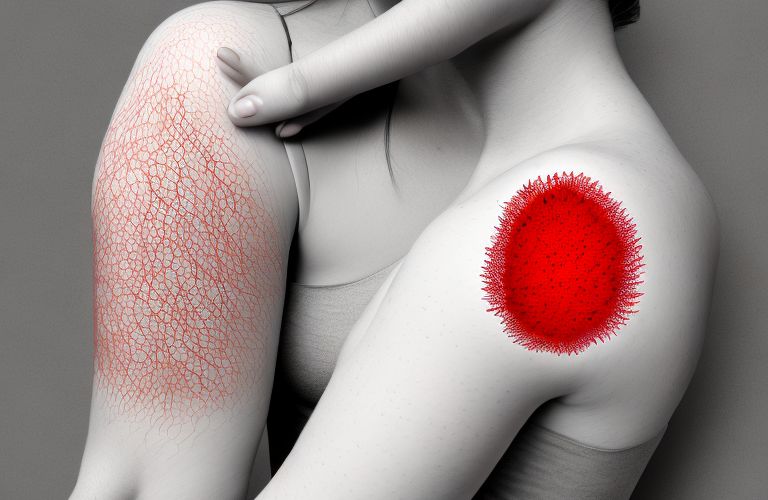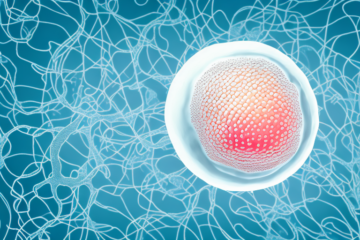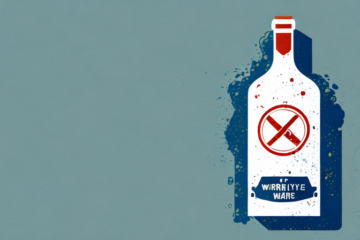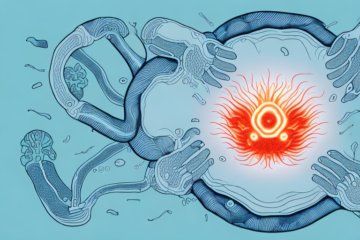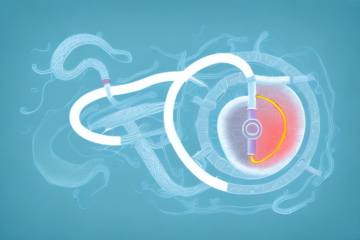Fifth disease, also known as erythema infectiosum, is a viral infection that commonly affects children aged 5 to 15 years old. This condition is caused by human parvovirus B19, which is transmitted through respiratory secretions, such as coughs and sneezes. In this article, we will discuss in detail what fifth disease is, its causes, symptoms, diagnosis, treatment options, home remedies, complications, precautions for pregnant women, prevention measures, and differences between fifth disease and other similar conditions.
What is Fifth Disease?
Fifth disease presents as a mild illness characterized by a distinctive rash on the face, arms, and legs. It usually starts with flu-like symptoms, such as fever, headache, fatigue, and body aches. After a few days, a bright red rash appears on the cheeks giving the child the appearance of having been slapped. This is called the “slapped-cheek” rash. Within a week, a lacy rash may spread to the arms, trunk, and legs. The rash can itch and last for up to three weeks.
Fifth disease is caused by a virus called parvovirus B19. It is most common in children between the ages of 5 and 15, but can affect people of any age. The virus is spread through respiratory secretions, such as saliva or mucus, and can also be spread through blood transfusions or organ transplants.
While fifth disease is usually a mild illness, it can be more serious for certain groups of people, such as pregnant women and people with weakened immune systems. Pregnant women who contract fifth disease can pass the virus to their unborn baby, which can cause severe anemia and other complications. People with weakened immune systems, such as those with HIV or cancer, may develop more severe symptoms and complications from the virus.
Causes and Symptoms of Fifth Disease
Fifth disease is caused by a viral infection with human parvovirus B19. The virus is spread from person to person through respiratory secretions, such as coughing or sneezing. It is highly contagious, and outbreaks often occur in schools and daycare centers. The symptoms of fifth disease usually start with flu-like symptoms, such as fever, headache, fatigue, and body aches. This is followed by the characteristic “slapped-cheek” rash on the face and a lacy red rash on the arms, trunk, and legs.
In addition to the flu-like symptoms and rash, some people with fifth disease may experience joint pain and swelling. This is more common in adults than in children. Pregnant women who contract fifth disease may also be at risk of complications, such as anemia or miscarriage. It is important to seek medical attention if you suspect you or your child has fifth disease, especially if you or your child are pregnant or have a weakened immune system.
How is Fifth Disease Diagnosed?
Fifth disease is usually diagnosed based on its characteristic symptoms and physical examination. Blood tests can also be used to confirm the presence of human parvovirus B19 antibodies in the bloodstream. In rare cases, a skin biopsy may be done to confirm the diagnosis.
If you suspect that you or your child has been exposed to fifth disease, it is important to see a healthcare provider for an accurate diagnosis. Your healthcare provider may ask about your symptoms and medical history, as well as perform a physical examination. They may also order blood tests to confirm the presence of human parvovirus B19 antibodies in the bloodstream. It is important to note that not all cases of fifth disease require medical treatment, but it is still important to seek medical advice if you suspect you or your child has been infected.
Treatment Options for Fifth Disease
There is no specific treatment for fifth disease. The symptoms of fever and pain can be managed with over-the-counter medications, such as acetaminophen or ibuprofen. Antiviral medication may be used in rare cases of severe illness. Patients with fifth disease should also get plenty of rest and drink fluids to remain hydrated.
It is important to note that individuals with fifth disease should avoid contact with pregnant women, as the virus can cause complications for the developing fetus. Additionally, those with weakened immune systems or chronic illnesses may require more intensive medical care if they contract fifth disease. It is recommended to consult with a healthcare provider for personalized treatment recommendations.
Home Remedies for Managing the Symptoms of Fifth Disease
Home remedies can help manage the symptoms of fifth disease. You may try applying cool compresses or taking cool baths to relieve itchiness from the rash. In addition, it is recommended to avoid sunlight, which can cause the rash to worsen. You may also try using oatmeal bath products or lotions containing calamine to soothe the skin.
It is important to note that while home remedies can help manage the symptoms of fifth disease, they do not cure the illness. It is recommended to rest and stay hydrated to help the body fight off the virus. If you or your child experiences severe symptoms such as difficulty breathing or chest pain, seek medical attention immediately.
How Long Does Fifth Disease Last?
Fifth disease typically lasts for two to three weeks, with the rash lasting for up to three weeks. The symptoms usually peak in the first week and then gradually subside. Most children with fifth disease recover without any complications.
However, in rare cases, fifth disease can cause complications in adults with weakened immune systems or in pregnant women. In adults, fifth disease can cause joint pain and swelling that can last for several months. In pregnant women, fifth disease can cause complications such as anemia in the fetus, which can be life-threatening. It is important for pregnant women to avoid contact with anyone who has fifth disease and to seek medical attention if they suspect they have been exposed.
Can Adults Get Fifth Disease?
Yes, adults can get fifth disease. However, they are less susceptible to the condition because they have likely been exposed to the human parvovirus B19 earlier in life and have developed immunity to the virus.
It is important to note that while adults can get fifth disease, the symptoms may be more severe than in children. Adults with weakened immune systems, such as those with HIV or cancer, may also be at a higher risk for complications from the virus. If you suspect you have fifth disease, it is important to consult with a healthcare provider for proper diagnosis and treatment.
Complications Associated with Fifth Disease
Complications from fifth disease are rare, but they can occur. In some cases, fifth disease can cause anemia, particularly in people with weakened immune systems. Pregnant women who contract fifth disease may experience complications, such as miscarriage, stillbirth, or severe anemia in the fetus. In very rare cases, fifth disease can cause inflammation of the heart muscle or brain.
It is important to note that fifth disease is highly contagious and can easily spread through respiratory secretions, such as coughing and sneezing. Therefore, it is recommended to take precautions, such as washing hands frequently and avoiding close contact with infected individuals, to prevent the spread of the disease. Additionally, there is currently no vaccine or specific treatment for fifth disease, but symptoms can be managed with over-the-counter pain relievers and rest.
Precautions to Take While Pregnant or Around Pregnant Women with Fifth Disease
Pregnant women who contract fifth disease should consult their healthcare provider immediately. They will need to be monitored closely and may require treatment or additional testing. If you are pregnant or planning to become pregnant, it is important to avoid contact with individuals who have fifth disease, as it can be harmful to the developing fetus. Women who are not immune to human parvovirus B19 should consider getting vaccinated before becoming pregnant.
In addition to avoiding contact with individuals who have fifth disease, pregnant women should also take extra precautions to prevent the spread of the virus. This includes washing their hands frequently, avoiding sharing utensils or drinks with others, and avoiding crowded areas where they may come into contact with individuals who are sick.
If you have been exposed to fifth disease while pregnant, it is important to monitor yourself for symptoms such as fever, rash, and joint pain. If you experience any of these symptoms, contact your healthcare provider immediately. They may recommend additional testing or treatment to ensure the health and safety of both you and your developing baby.
Prevention Measures for Fifth Disease
To reduce your risk of contracting fifth disease, it is important to practice good hygiene. Wash your hands frequently, especially after coughing or sneezing, and avoid contact with people who are sick. If your child has fifth disease, keep them home from school or daycare until the rash has resolved. Adults who suspect they may have fifth disease should also stay home from work until their symptoms have subsided.
In addition to practicing good hygiene and avoiding contact with sick individuals, it is also recommended to boost your immune system through a healthy diet and regular exercise. This can help your body fight off infections, including fifth disease. It is also important to stay up to date on vaccinations, as some vaccines can protect against certain strains of the virus that causes fifth disease.
Differences Between Fifth Disease and Other Similar Conditions
Fifth disease is often mistaken for other viral illnesses, such as rubella, measles, or scarlet fever. However, there are some distinct differences between these conditions. For example, rubella and measles usually present with a high fever, while scarlet fever causes a rash all over the body. Fifth disease, on the other hand, starts with flu-like symptoms and a “slapped-cheek” rash before spreading to the rest of the body with a lacy rash. If you suspect you or your child may have fifth disease, it is important to see your healthcare provider for an accurate diagnosis.
In summary, fifth disease is a viral infection that typically affects children. It is characterized by flu-like symptoms and a “slapped-cheek” rash on the face, followed by a lacy rash on the body. The condition is highly contagious but usually resolves on its own without any complications. Pregnant women and people with weakened immune systems are at risk of developing complications from fifth disease, and precautions should be taken to avoid exposure. It is important to practice good hygiene and seek medical attention if you suspect you or your child may have fifth disease.
While fifth disease is generally a mild illness, it can cause complications in certain cases. For example, in rare cases, fifth disease can cause joint pain and swelling, especially in adults. Additionally, people with sickle cell anemia or other blood disorders may experience a more severe form of the illness. It is important to monitor symptoms closely and seek medical attention if you or your child experiences any concerning symptoms.
Preventing the spread of fifth disease is crucial, especially in settings such as schools and daycare centers. Good hygiene practices, such as frequent hand washing and covering coughs and sneezes, can help prevent the spread of the virus. If you or your child is diagnosed with fifth disease, it is important to stay home from school or work until the rash has fully cleared to avoid spreading the virus to others.

